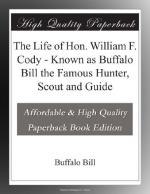Although they were entirely surrounded, and one hundred and ten miles from the nearest post, the men did not despair. They had an abundance of ammunition, plenty of water, under ground only a short distance, and for food they had their horses and mules. At night two of the scouts, Tradeau and Stillwell, stole through the lines of the Indians, and started swiftly for Fort Wallace to obtain relief. It was a dangerous undertaking, but they were brave and experienced scouts. Stillwell was only nineteen or twenty years old, but he was, in every sense of the word, a thoroughbred frontiersman.
During the night the besieged scouts threw up their breastworks considerably higher and piled the dead animals on top. They dug down to water, and also stored away a lot of horse and mule meat in the sand to keep it fresh as long as possible. The Indians renewed their firing next morning, and kept it up all day, doing but little injury, however, as the scouts were now well entrenched; but many an Indian was sent to his happy hunting ground.
[Illustration: BATTLE ON THE ARICKARRE]
Night came again, and the prospects were indeed gloomy. An attempt was made by two more of the scouts to creep through the Indian lines, but they were detected by the enemy and had to return to their comrades. The next morning the Indians renewed hostilities as usual. Their women and children began to disappear about noon, and then the Indians tried to draw the scouts out by displaying a white flag for a truce. They appeared to want to have a talk with General Forsyth, but as their treachery was well-known, the scouts did not fall into this trap. The Indians had apparently become tired of fighting, especially as they found that they had a most stubborn foe to deal with.
Night once more threw its mantle over the scene, and under the cover of the darkness Donovan and Plyley, two of the best scouts, stealthily made their way out of the camp, and started for Fort Wallace with a dispatch from General Forsyth, who gave a brief summary of the situation, and stated that if necessary he could hold out for six days longer.
When the day dawned again, only a small number of warriors could be seen, and they probably remained to watch, the scouts and keep them corraled. The uninjured men attended to the wounded as well as they could under the adverse circumstances, but from want of proper treatment, evidences of gangrene appeared in some of the wounds on the sixth day. The mule and horse meat became totally unfit for use, but they had nothing else to eat, and had to eat it or starve. Under these trying circumstances the General told the men that any who wished to go might do so, and take their chances; but they all resolved to remain, and die together, if need be.
Relief came at last. Tradeau and Stillwell had safely reached Fort Wallace, and on the morning of the 25th of September, Colonel Carpenter and a detachment of cavalry arrived with supplies. This assistance to the besieged and starving scouts came like a vessel to ship-wrecked men drifting and starving on a raft in mid-ocean.




